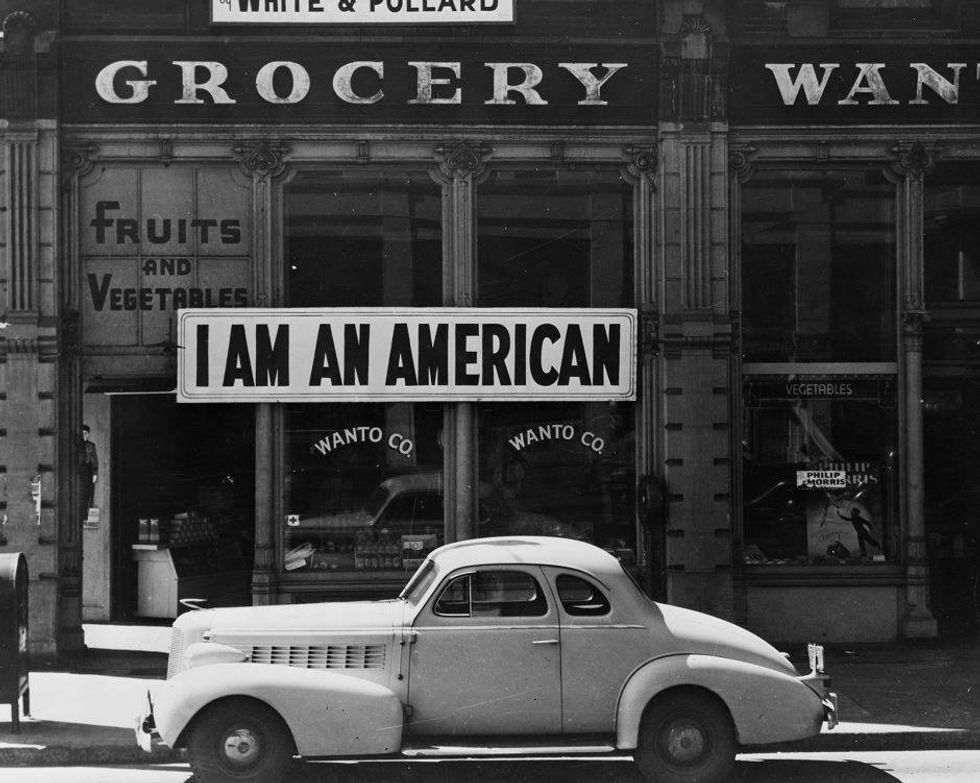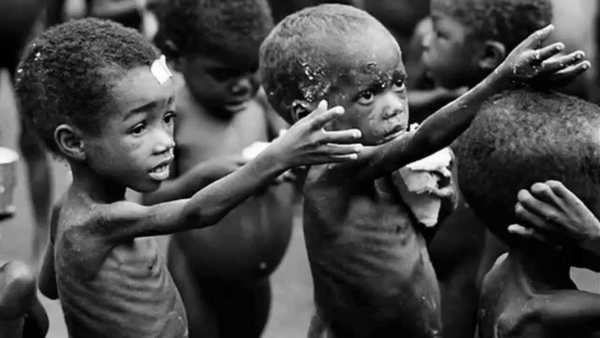Oakland, Calif., Mar. 1942. A large sign reading “I am an American” placed in the window of a store, at 13th and Franklin streets, on December 8, the day after Pearl Harbor. The store was closed following orders to persons of Japanese descent to evacuate from certain West Coast areas. The owner, a University of California graduate, will be housed with hundreds of evacuees in War Relocation Authority centers for the duration of the war.
Seventy-five years ago, on December 7, 1941, Japan attacked the United States naval base at Pearl Harbor in Hawaii. The strike on December seventh catalyzed the United States involvement in World War II and prompted the country to enter a chilling state of xenophobia.
Two months later, president Franklin Delano Roosevelt issued Executive Order 9066, authorizing the relocation and incarceration of anyone deemed a threat to national security. Due to this order, more than 120,000 men, women and children of Japanese ancestry were forced to move to isolated internment camps, where they would stay until the end of the war. Over two-thirds of those incarcerated were American citizens. An FBI report from the time reads: "It is said, and no doubt with considerable truth, that every Japanese in the United States who can read and write is a member of the Japanese intelligence system.”
Photographer Dorothea Lange, known for her unflinchingly honest documentation of poverty-stricken Americans during the Great Depression, quietly photographed and chronicled the prison camps in California, as well as Washington, Oregon, and Arizona, where people of Japanese ancestry were incarcerated between 1942 and 1946. She was eager to take the commission, despite being opposed to the effort, as she believed “a true record of the evacuation would be valuable in the future.” What military commanders realized, however, was that the pictures also stood as lawful evidence of the torture that occurred in those camps; a stark reminder of the bleak state of a country ruled by its fear. The military seized her photographs, confidentially depositing them in the National Archives, where they remained unseen until 2006.
The pictures, shattering the "defender of the free world narrative" which has been instilled in Americans time and time again, depict thousands of Japanese American citizens, many of them children, being forced by the military to evacuate their homes and relocate to prison camps where they lived surrounded by barbed wire and armed men for up to four years, if they survived to see the end. Many died due to a lack of medical care, emotional stress or were killed by military guards.
"Good manners eroded as meals were always hurried, reducing the ritual and elegance of Japanese cooking and serving to mere feeding the body. Maintaining personal cleanliness was difficult due to chronic shortage of soap and hot water. Lack of insulation and ventilation made the cubbyholes in which they lived freezing in winter and sweltering in summer. No decent provision for washing diapers. Dust. Mud. Ugliness. Terrible food—definitely not Japanese—doled onto plates from large garbage cans. Nothing to do. Lines for breakfast, lines for lunch, lines for supper, lines for mail, lines for the canteen, lines for laundry tubs, lines for toilets. The most common activity is waiting.”
And it was all on camera. By the time the final camp was dismantled in 1946, Lange had taken over 800 photographs documenting the inhumanity of their circumstances.
Lange's photographs, a reminder of the searing state of a broken nation, have risen to prominence on the internet in recent days. The photographs have become disturbingly foreboding in the wake of comments by Carl Higbie, a former representative of one of the biggest super PACS to back Trump’s candidacy, suggesting that the incarceration of Japanese Americans during the 1940s set a “precedent” for a Muslim registry.
The President-elect himself, Donald Trump, told TIME magazine that he does not know whether he would have supported or opposed the internment of Japanese Americans during World War II. “I would have had to be there at the time to tell you, to give you a proper answer,” he said.
Trump's campaign, centered around fear and only built up this high by stepping on minority groups along the way, is painfully reminiscent of the fear that plagued the United States in the 1940's. The same fear that resulted in the wrongful, inhumane incarceration of Japanese-Americans.
This is what happens when we look the other way, when we allow the government too much power over the people they're supposed to serve and protect. But we're better than this; we have to be.
As the country fearfully awaits the fate of the nation under a Trump presidency, Lange's photos serve as a crucial reminder of the cruelty that is possible when fear clouds reason and hatred obstructs empathy. Right now is, more so than ever, a time to remember the past and do everything in our power not to repeat it, no matter what the government may try. At the end of the day, a government's power is intended to come from its people. It is a time to restore our empathy and rebuild a nation where everyone is given an equal opportunity to flourish. As a country and as a people, we cannot let fear win.



















